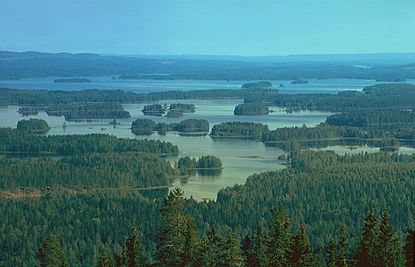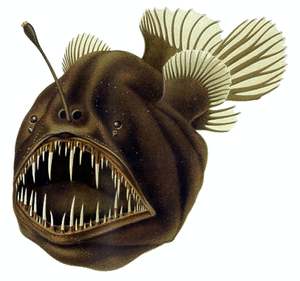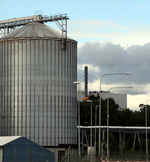Portal:Ecology
| |
|
|
Ecology
|
|
Ecology (from Ancient Greek Ecology is a branch of biology, and is the study of abundance, biomass, and distribution of organisms in the context of the environment. It encompasses life processes, interactions, and adaptations; movement of materials and energy through living communities; successional development of ecosystems; cooperation, competition, and predation within and between species; and patterns of biodiversity and its effect on ecosystem processes. Ecology has practical applications in conservation biology, wetland management, natural resource management (agroecology, agriculture, forestry, agroforestry, fisheries, mining, tourism), urban planning (urban ecology), community health, economics, basic and applied science, and human social interaction (human ecology). The word ecology (German: Ökologie) was coined in 1866 by the German scientist Ernst Haeckel. The science of ecology as we know it today began with a group of American botanists in the 1890s. Evolutionary concepts relating to adaptation and natural selection are cornerstones of modern ecological theory. Ecosystems are dynamically interacting systems of organisms, the communities they make up, and the non-living (abiotic) components of their environment. Ecosystem processes, such as primary production, nutrient cycling, and niche construction, regulate the flux of energy and matter through an environment. Ecosystems have biophysical feedback mechanisms that moderate processes acting on living (biotic) and abiotic components of the planet. Ecosystems sustain life-supporting functions and provide ecosystem services like biomass production (food, fuel, fiber, and medicine), the regulation of climate, global biogeochemical cycles, water filtration, soil formation, erosion control, flood protection, and many other natural features of scientific, historical, economic, or intrinsic value. (Full article...) Selected article -For a small country, Albania is characterised by a considerable wealth of terrestrial and marine ecosystems and habitats with contrasting floral, faunal, and fungal species, defined in an area of 28,748 square kilometres. Most of the country is predominantly of Mediterranean character, comprehending the country's center and south, while the alpine affinity is more visible in the northeast. Apart the diversity of topography and climate, the direct proximity of Albania to the Mediterranean Sea and the significant location within the European continent have created favorable conditions for appearance of a vast array of flora, fauna and funga with an immense quality, which led the country to be recognised as an important biodiversity hotspot in the continent. The number of globally threatened faunal species in Albania is high with an integral part of more than 181 species, ranking seventh in the Mediterranean Basin. (Full article...)Selected image - Credit: Paul Lenz General imagesThe following are images from various ecology-related articles on Wikipedia.
Related WikiProjectsThings you can do
Entries here consist of Good and Featured articles, which meet a core set of high editorial standards.
 Aggressive mimicry is a form of mimicry in which predators, parasites, or parasitoids share similar signals, using a harmless model, allowing them to avoid being correctly identified by their prey or host. Zoologists have repeatedly compared this strategy to a wolf in sheep's clothing. In its broadest sense, aggressive mimicry could include various types of exploitation, as when an orchid exploits a male insect by mimicking a sexually receptive female (see pseudocopulation), but will here be restricted to forms of exploitation involving feeding. For example, indigenous Australians who dress up as and imitate kangaroos when hunting would not be considered aggressive mimics, nor would a human angler, though they are undoubtedly practising self-decoration camouflage. Treated separately is molecular mimicry, which shares some similarity; for instance a virus may mimic the molecular properties of its host, allowing it access to its cells. An alternative term, Peckhamian mimicry, has been suggested (after George and Elizabeth Peckham), but it is seldom used. Aggressive mimicry is opposite in principle to defensive mimicry, where the mimic generally benefits from being treated as harmful. The mimic may resemble its own prey, or some other organism which is beneficial or at least not harmful to the prey. The model, i.e. the organism being 'imitated', may experience increased or reduced fitness, or may not be affected at all by the relationship. On the other hand, the signal receiver inevitably suffers from being tricked, as is the case in most mimicry complexes. (Full article...)Selected biography -
William Skinner Cooper (25 August 1884 – 8 October 1978) was an American ecologist. Cooper received his B.S. in 1906 from Alma College in Michigan. In 1909, he entered graduate school at the University of Chicago, where he studied with Henry Chandler Cowles, and completed his Ph.D. in 1911. His first major publication, "The Climax Forest of Isle Royale, Lake Superior, and Its Development" appeared in 1913. (Full article...)
Did you know (auto-generated)
Selected quote -
Ecology news
Additional News Highlights
Selected publication -Ibis, subtitled the International Journal of Avian Science, is the peer-reviewed scientific journal of the British Ornithologists' Union. Topics covered include ecology, conservation, behaviour, palaeontology, and taxonomy of birds. It's available for free on the internet for institutions in the developing world through the OARE scheme (Online Access to Research in the Environment). (Full article...) Related portalsMore did you know -Related articlesAssociated WikimediaThe following Wikimedia Foundation sister projects provide more on this subject:
Web resources
Discover Wikipedia using portals |
















































